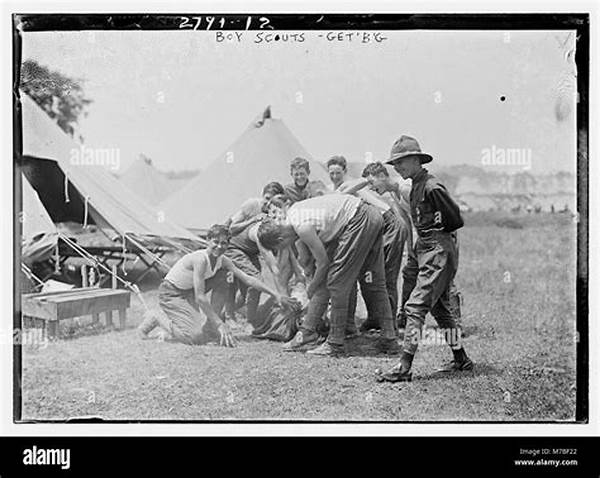History isn’t just about dates and facts; it’s about people and their stories. Think about it: what better way to keep our shared history alive than through public participation in historical commemoration? Getting involved isn’t just a nice feeling; it’s essential to preserving and appreciating the events that shaped our world. You have a part to play in this grand storytelling. Yep, you! Imagine the thrill of joining a community event, unveiling a plaque, or sharing stories with future generations. Intrigued? Keep reading to discover how you can make history more than just a page in a textbook.
Read Now : Interactive Learning Platforms For Educators
The Importance of Inclusivity in Historical Commemoration
Public participation in historical commemoration goes beyond just showing up at events; it’s about creating an inclusive space for all voices to be heard. Take a moment to imagine a commemoration event that doesn’t just focus on major figures but also highlights everyday heroes—the teachers, nurses, and community leaders. Everyone’s story matters. When we invite diverse communities to participate, we enrich the narrative, showcasing a tapestry of experiences that brings history to life like never before. Inclusion isn’t a buzzword; it’s the heart and soul of historical commemoration. With each story shared, we deepen our understanding and appreciation of our collective past.
Imagine, for instance, a commemoration event for a significant war. Now think about incorporating stories from not just the soldiers but also those who worked tirelessly behind the scenes—factory workers, medics, and families who supported from afar. This multidimensional approach provides a richer, more vibrant picture of history. Public participation in historical commemoration means everyone gets a seat at the table. You’re not just observing history; you’re actively engaging in it, adding nuances that can change perceptions and inspire future generations.
Benefits of Public Participation in Historical Commemoration
1. Community Building: Public participation in historical commemoration strengthens community bonds by bringing people together for a shared purpose. It’s about connecting and reconnecting with neighbors and fellow citizens.
2. Educational Opportunities: Engaging in commemoration events offers a hands-on learning experience that no classroom can replicate. It allows for dynamic interaction with history.
3. Cultural Appreciation: By celebrating diverse stories, public participation fosters a deeper appreciation for various cultures and backgrounds, promoting unity through understanding.
4. Preservation of Heritage: Involving the public ensures that important histories are remembered and preserved for future generations, instilling a sense of pride and continuity.
5. Empowerment: When individuals participate, they feel a sense of ownership over their history, empowering them to contribute their stories and perspectives.
The Role of Technology in Modern Commemorations
Enter the 21st century, where public participation in historical commemoration is going digital! Technology has revolutionized the way we engage with history, breaking barriers and making participation more accessible than ever. Social media platforms and virtual reality experiences are transforming commemorations into interactive events. Imagine attending a virtual tour of a historic battlefield from your living room. Pretty cool, right? With just a smartphone or computer, these digital tools allow anyone, anywhere, to be part of commemorating significant moments.
The power of technology lies in its ability to connect people worldwide, turning local commemorations into global events. Online forums and platforms enable individuals to share their unique stories, adding diverse perspectives to historical narratives. Public participation in historical commemoration isn’t limited by geography anymore. Virtual commemorations also open doors for those who may face barriers to physical participation, ensuring inclusivity. This digital shift isn’t just a trend; it’s a transformation, reshaping how we preserve and honor our past.
How Local Governments Can Encourage Participation
Local governments play a pivotal role in encouraging public participation in historical commemoration. Here are ten ways they can make a difference:
1. Grant Support: Offer financial assistance or grants to community groups organizing commemorations.
2. Public Awareness: Launch awareness campaigns to highlight the significance of local historical events.
3. Inclusive Policies: Create policies that ensure events are inclusive and accessible to all demographics.
Read Now : Trailblazing Women In Cartoon Films
4. Educational Partnerships: Partner with schools to integrate commemoration projects into the curriculum.
5. Social Media Campaigns: Use social media to promote events, engage citizens, and share stories.
6. Multilingual Resources: Provide resources and materials in multiple languages to reach diverse communities.
7. Volunteer Programs: Develop programs that encourage citizens to volunteer in organizing events.
8. Collaboration with NGOs: Work with NGOs focused on historical preservation and education.
9. Digital Archives: Establish digital archives where citizens can access and contribute historical documents.
10. Feedback Channels: Create avenues for the public to suggest ideas for future commemorations.
Why Your Participation Matters More Than Ever
So, why does public participation in historical commemoration matter so much today? History is not a static tale; it evolves with every new story and perspective we add. Your voice, your experiences, and your understanding of history can change how future generations view the past. It’s easy to think that commemorations are for historians or those directly connected to events, but that’s a myth. You don’t need a history degree or a personal connection to make a difference. Your involvement enriches the narrative, ensuring that a variety of experiences and memories are preserved for posterity.
Moreover, by participating, you’re taking a stand against historical erasure. Many events and stories risk being forgotten if not actively commemorated. Public participation in historical commemoration ensures that these stories endure, serving as a reminder of both triumphs and lessons learned. Your contribution, no matter how small, can spark conversations that lead to greater understanding and empathy. Imagine explaining to a younger generation the significance of a local monument or teaching them a traditional song tied to a historic event. Participation is powerful, and your contribution is vital.
Conclusion: Be the Change in Historical Narration
To wrap things up, public participation in historical commemoration is crucial in shaping an inclusive, vibrant, and comprehensive understanding of our past. By engaging in these commemorations, you become an active participant in storytelling, preserving history in a way that books alone cannot achieve. Whether you’re attending a virtual event, volunteering at a local ceremony, or simply sharing stories on social media, every effort counts.
Remember, history isn’t just what’s written in textbooks; it’s lived, experienced, and shared by you and those around you. Your involvement enriches the collective memory, ensuring that a diverse range of voices and experiences contribute to the true tapestry of history. So, step up and join the movement. Be the change in historical narration. Public participation in historical commemoration isn’t just an opportunity; it’s a responsibility. And you, yes you, have the power to make history unforgettable.


